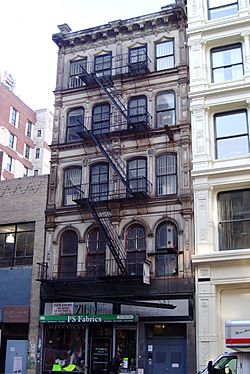359 Broadway facts for kids
Quick facts for kids 359 Broadway |
|
|---|---|

(2012)
|
|
| General information | |
| Architectural style | Italianate |
| Location | Manhattan, New York City |
| Address | 359 Broadway |
| Coordinates | 40°43′02″N 74°00′15″W / 40.71736°N 74.00412°W |
| Completed | 1852 |
| Height | 55.38 ft (16.88 m) |
| Technical details | |
| Floor count | 5 |
| Design and construction | |
| Architecture firm | Field & Correja |
| Designated: | October 16, 1990 |
| Reference #: | 1758 |
359 Broadway is an important building in the Tribeca neighborhood of Manhattan, New York City. It stands on the west side of Broadway between Leonard and Franklin Streets. This five-story building was finished in 1852. It was designed by the architecture firm Field & Correja in the Italianate style. This style was popular in the 1800s and often featured tall, narrow windows and decorative details.
Contents
History of 359 Broadway
Early Use by Mathew Brady
From 1853 to 1859, the famous photographer Mathew Brady used the top three floors of 359 Broadway. He set up his portrait studio there. Brady took pictures of many well-known Americans during this time. For many years, people walking on Broadway could see a faded painted sign for Mathew Brady's Studio on the south side of the building. However, this sign was painted over before 1990.
Building Ownership Changes
In 1943, three partners bought the building: brothers Mark Tennenbaum and Emil Tanner, and their brother-in-law Leo Beller. They ran a business that sold textiles from the building. The partners retired in the early 1970s, and the building was then sold to new owners.
A New York City Landmark
Protecting the Building's Future
In 1990, 359 Broadway was officially named a New York City designated landmark. This means the building is special and protected because of its history and design. There was a long discussion between the city and the building's owner about this decision.
Why It's a Landmark
In 1992, a judge named Karla Moskowitz agreed that the building should be a landmark. She said it was clear the building was important for both its architecture and its history. The New York City Landmarks Preservation Commission wanted to protect the building for two main reasons. First, it was home to Mathew Brady's famous studio. Second, each of the building's five floors has unique windows. This shows that the building was designed with special care, not just built for everyday use.
See also
 In Spanish: 359 Broadway para niños
In Spanish: 359 Broadway para niños

